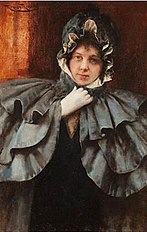Romà Ribera

Romà Ribera i Cirera (13 December 1848, Barcelona - 29 May 1935, Barcelona) was a Catalan genre painter. He specialized in contemporary scenes from upper-class social events, rendered in meticulous detail, but also did numerous scenes from life in the 17th and 18th centuries.
Biography[]
He studied at the Escola de la Llotja and at the private school operated by Pere Borrell del Caso.[1] In 1873, he went to Rome to complete his studies. While there, he met Marià Fortuny, who works would influence his style.[2] After leaving Italy, he visited London to exhibit.
Once he had established himself, he settled in Paris. At a time when most artists were attracted to impressionism, he found inspiration in the works of James Tissot and Alfred Stevens. In 1878, he enjoyed great success at the Exposition Universelle.[2] This enabled him to retain Adolphe Goupil as his agent.[1] To maximize his income, he chose to solicit clients from the upper classes, portraying their activities and possessions.
He had a major showing at the exhibition at the 1888 Barcelona Universal Exposition, where he presented a series of watercolors. He returned to Barcelona in 1889, exhibiting at the Sala Parés.[2] He pursued the same upper class client strategy there that he had in Paris. Occasionally, he travelled to exhibit in Madrid.
In 1902, he became a member of the Reial Acadèmia Catalana de Belles Arts de Sant Jordi and was chosen to sit on the "".[1]
Selected paintings[]

Leaving the Liceu

In the Tavern

Young Woman

Epilogue to the Masked Ball

In the Evening
References[]
- ^ Jump up to: a b c Brief biography @ the Gran Enciclopèdia Catalana.
- ^ Jump up to: a b c Brief biographies @ Foro Xerbar.
External links[]
| Wikimedia Commons has media related to Romà Ribera. |
- 1848 births
- 1935 deaths
- 19th-century Catalan painters
- 20th-century Catalan painters
- Spanish genre painters
- Painters from Barcelona




